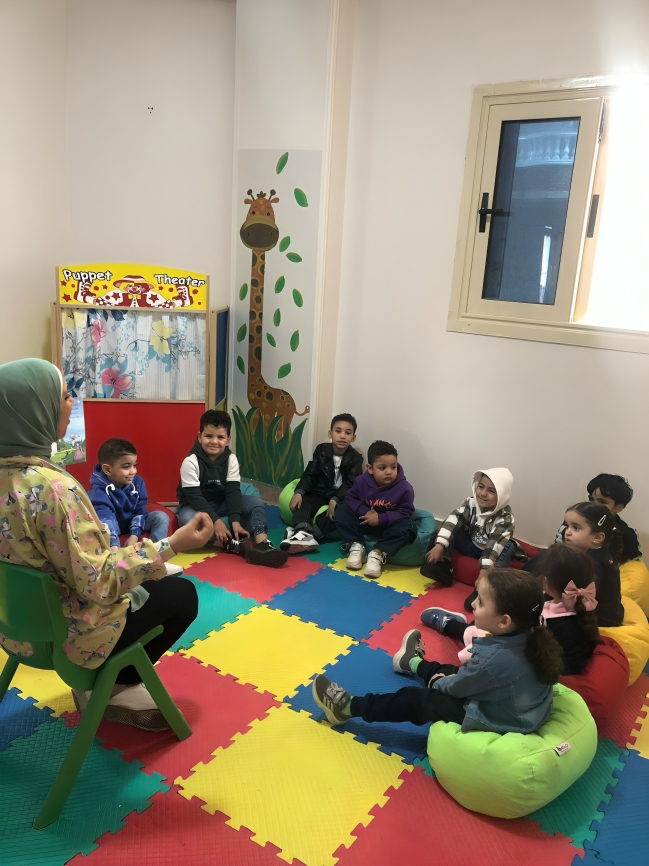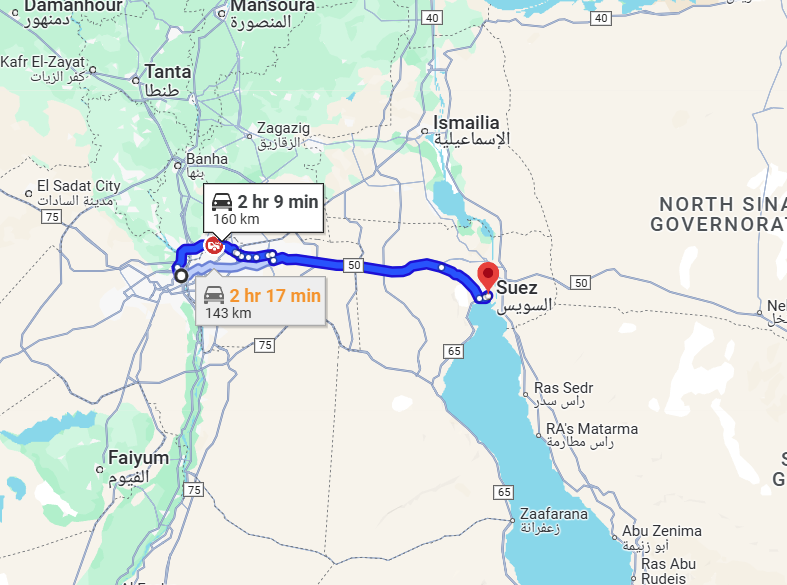📞 Contact Information:
📍 Address: Salam 1, Omar Ibn Al-Khattab Street, after Al-Taqwa Mosque, in front of Café 4A, Suez Governorate, Egypt
📱 Phone Number: +20 12 05854318
Little Stars Nursery
The nursery aims to provide a safe and stimulating educational environment that helps the child grow comprehensively in their cognitive, psychological, and social aspects, within an atmosphere of love, support, and care.
- Phone: +20 12 05854318
- Website:
- Opens at: 07:30
- Closes at: 15:00
Working Days
Sunday
Monday
Tuesday
Wednesday
Thursday
Saturday
Little Stars Nursery
📘 About Little Stars Nursery – Suez:
Little Stars Nursery is considered one of the most distinguished nurseries in Suez Governorate, located in a quiet and prime area in Salam 1, Omar Ibn Al-Khattab Street, after Al-Taqwa Mosque and in front of Café 4A. The nursery aims to provide a safe and stimulating educational environment that helps children grow comprehensively in their cognitive, psychological, and social aspects, within an atmosphere of love, support, and care. It focuses on the importance of early childhood as the foundation for building the child's personality by offering modern curricula based on interaction, participation, and discovery through enjoyable educational activities. The nursery also places great emphasis on promoting educational values and cultural identity while ensuring that the child is well-prepared to transition confidently and smoothly into primary education.
✨ Features of Little Stars Nursery:
📚 1. Modern Educational Curricula:
The nursery uses advanced curricula tailored to suit early developmental stages, focusing on enhancing thinking, language, and communication skills.
Learning materials are integrated with hands-on and interactive activities for enjoyable and effective learning.
Curricula are regularly updated to align with modern educational trends and children's diverse abilities.
🧸 2. Safe and Stimulating Environment:
The nursery offers a clean, secure space fully equipped with age-appropriate recreational and comfort facilities. Every corner is thoughtfully designed to make children feel warm and welcome.
Top safety standards are maintained in classrooms and play areas, with regular maintenance of all tools and toys.
There are also green areas and open spaces for physical activities and free play.
👩🏫 3. Specialized and Caring Educational Staff:
The team comprises experienced educators continuously trained in modern teaching methods and child psychology.
They provide personalized attention to build each child’s confidence and support emotional and social growth.
The staff is known for their warmth, patience, and genuine care for each child.
🎨 4. Varied Educational and Recreational Activities:
The nursery offers a range of activities including arts and crafts, group games, music sessions, and small theatrical performances.
These aim to stimulate creativity and social skills in an enjoyable setting.
Internal educational trips are organized to connect learning with real-world experiences.
👨👩👧👦 5. Ongoing and Effective Parent Communication:
Parents receive regular updates on their children’s progress through daily and weekly reports.
Scheduled meetings are held to discuss any observations or suggestions.
Parents are considered partners in the educational journey and are involved in nursery events and activities.
🍽️ 6. Nutritious and Balanced Meals:
Daily fresh meals are prepared under the supervision of nutrition experts to ensure a healthy diet.
Special dietary needs and allergies are taken into consideration.
Children are also taught table manners and encouraged to be independent during meals.
🩺 7. Health Supervision and Routine Checkups:
A medical team oversees children’s health with regular checkups and on-site care.
Staff are trained in first aid and emergency response.
Personal hygiene is closely monitored, and cleanliness is prioritized throughout the facility.
🎉 8. Fun and Educational Events:
The nursery celebrates national and religious occasions with parties, shows, and trips.
These events strengthen team spirit and social bonds among children.
Parents are also invited to participate in some of these events, reinforcing the community atmosphere.
🌐 9. Value and Cultural Identity Education:
Children learn basic moral principles and religious values in a simple, age-appropriate way.
Workshops on heritage and positive customs help instill identity and belonging.
Respect, cooperation, and tolerance are core values encouraged in daily routines.
💻 10. Use of Modern Technology:
Interactive educational tools and smart programs are used to enhance the learning process and encourage engagement.
Technology is incorporated in a balanced, child-appropriate manner.
Visual aids and interactive digital stories are part of the daily schedule to enrich understanding.
🔚 Conclusion:
Little Stars Nursery is more than just a childcare facility—it's a holistic environment dedicated to nurturing your child’s emotional, mental, and physical development.
Thanks to its qualified team, outstanding curriculum, and innovative approach, the nursery offers a unique educational experience that prepares children confidently for school life.
If you are seeking a place that blends modern learning with genuine care, Little Stars Nursery is your ideal choice in Suez.
FAQ
Nurseries in Egypt are divided into several types based on their goals and educational content, including:
1. Educational Nurseries:
Focus on teaching children the basics of reading, writing, and languages. They often follow curricula like Montessori or the British system.
2. Developmental Nurseries:
Aim to enhance social and behavioral skills such as discipline, cooperation, and independence.
3. Religious Nurseries:
Focus on Quran memorization and teaching religious values and ethics in a conservative environment.
4. Specialized Nurseries:
Cater to specific groups such as:
Children with special needs.
Language-focused nurseries (e.g., French – German).
Art or sports-oriented nurseries.
5. Governmental and Private Nurseries:
Governmental: Low-cost and supervised by the Ministry of Social Solidarity.
Private: Run by individuals or private institutions, and vary in quality and services offered.
Tip: Choosing a nursery should be based on the quality of care, safety, and the level of individual attention given to each child.
The Egyptian law outlines several key objectives that nurseries aim to achieve, including:
1. Comprehensive Social Care:
Providing a safe and stimulating environment that takes care of the child physically, psychologically, and socially.
2. Development of Skills and Abilities:
Supporting children's talents and discovering their abilities through age-appropriate educational and recreational activities.
3. Integrated Preparation:
Preparing the child physically, culturally, psychologically, and morally in alignment with Egyptian societal values and religious identity.
4. Communication with the Family:
Raising awareness among parents and providing educational guidance to support proper parenting at home.
5. Strengthening Social Bonds:
Building a strong, interactive relationship between the nursery and the child’s family to ensure a continuous, well-rounded environment for growth and learning.
Note:
Nurseries are not just places to keep children, but they are key partners in education, laying the foundation for a strong and socially responsible personality for the child.
Nurseries have several important aspects that contribute to the child’s overall development:
1. Educational Aspect:
By providing educational and developmental activities, such as learning numbers, letters, and language basics, nurseries help children develop their cognitive skills.
2. Social Aspect:
The nursery provides a social environment that allows children to interact with their peers, learning communication skills, cooperation, and problem-solving.
3. Emotional Aspect:
Through emotional support from teachers, children learn how to manage their emotions and develop self-confidence.
4. Physical Aspect:
Physical activities help children develop fine and gross motor skills, such as running, jumping, and playing with educational toys.
5. Creative Aspect:
Creative activities like drawing, modeling with clay, and music help enhance children's imagination and boost their creative skills.
All these aspects work together to develop a well-balanced personality in children, enabling them to adapt to various aspects of life.
Here are 8 steps to ease the child’s transition to pre-school:
1. Visit the school together:
Introduce the child to the school environment beforehand so they can acclimate to it.
2. Meet new friends:
Encourage the child to meet other children so they can make new friends.
3. Role-play school:
Use school-related games at home to demonstrate the daily school routine.
4. Turn skills into games:
Make learning skills like dressing fun and engaging for the child.
5. Talk about your experience:
Share your own school experiences to create a positive image of school for the child.
6. Establish a new routine:
Set a regular daily routine to prepare the child for school.
7. Listen to your child:
Pay attention to the child’s feelings and concerns about school.
8. Create a comforting goodbye plan:
Make the child’s farewell comfortable and encouraging.
These steps help ease the child’s transition to a new stage.
Nursery is extremely important for children because it helps prepare them for the next educational stage and promotes their social and cognitive development. Through nursery, children learn how to build social relationships outside of the family, which enhances their communication and cooperation skills.
Nursery also contributes to developing critical thinking in children, helping them understand and analyze situations more effectively. It encourages a positive attitude towards learning, fostering their love for exploration and independent learning.
Additionally, nursery helps build the child’s self-confidence, which enables them to adapt better to the school environment in the future and enhances their ability to persevere and succeed.
Public Universities
Private universities
International universities
Accredited higher institutes
Government schools
Private schools
International schools
Language schools
Al-Azhar Schools
Special education schools
STEM schools
Teachers and lecturers
Nurseries
Language education centres
Programming and technology centers
Medical Training Academies


